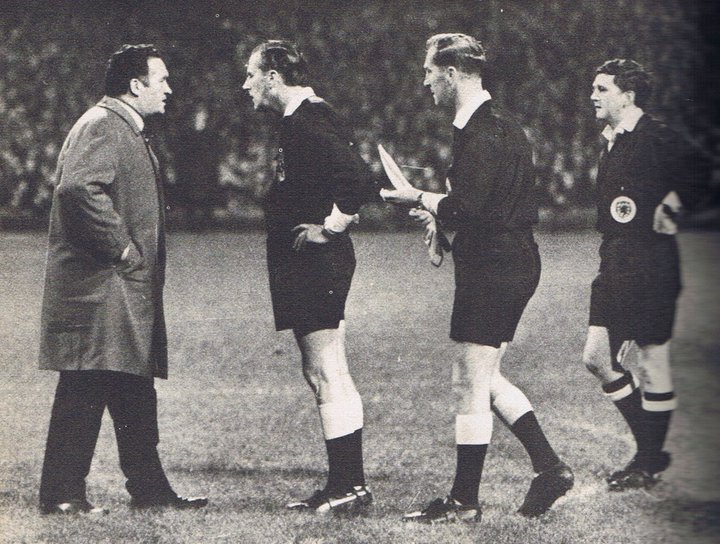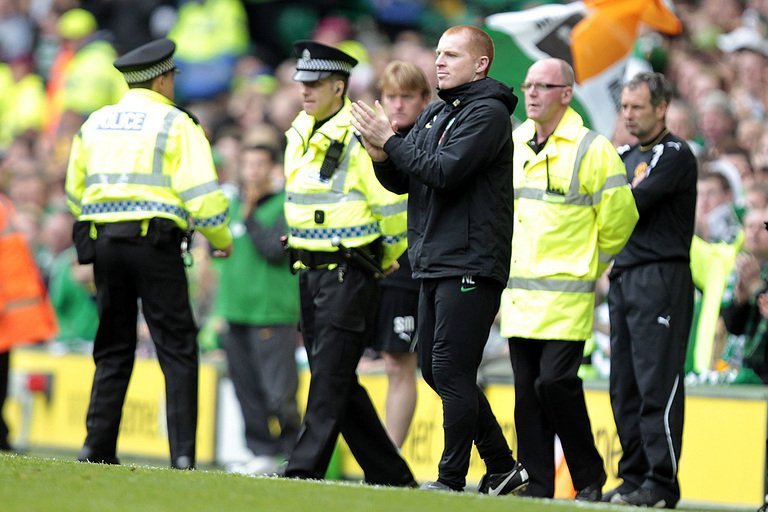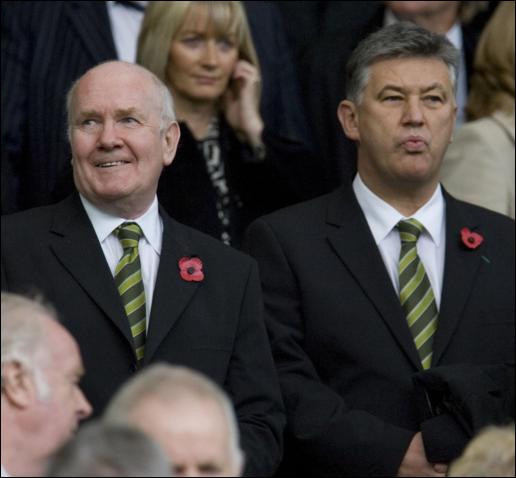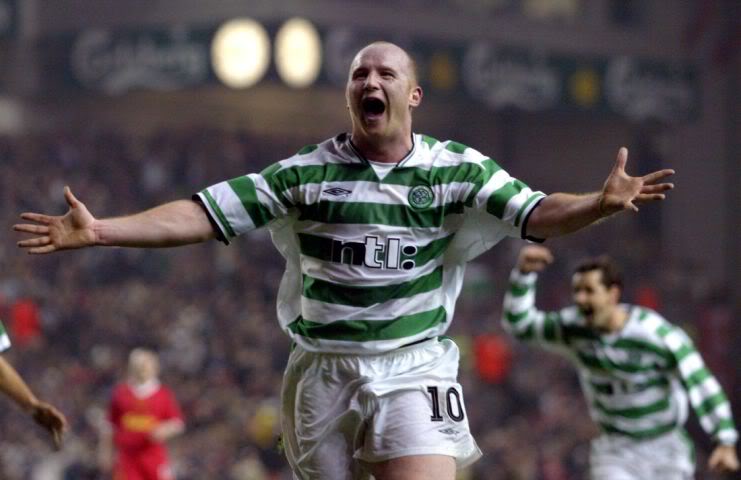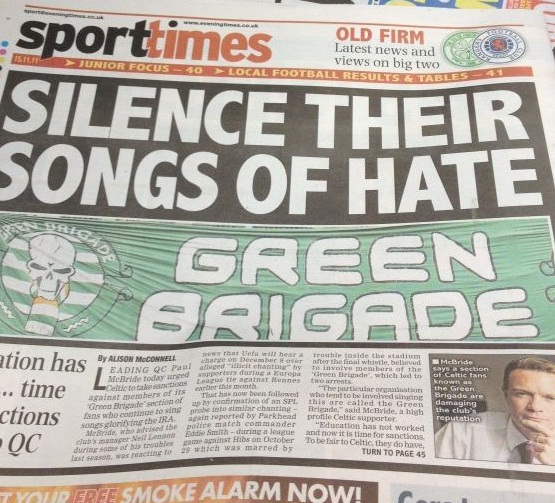The real issue here is not whether the actions of Neil Lennon are appropriate. I don’t particularly like to see public confrontations between managers and referees. I can often sympathise with the manager’s reaction but it is ultimately a futile gesture in a world where transparency and accountability seem all but extinct. What really lies at the heart of the matter is why the actions of Neil Lennon are magnified, scrutinised and criticised to an unprecedented degree. Each season there are countless examples of managers and officials clashing. Wenger, Sergio, Ferguson, Coyle, Pressley, McCall, Pulis. You could go on and on. And every one is a so called “repeat offender”. Yet none receive the ferocious blanket coverage reserved for the manager of Celtic.
Now we also see a new narrative emerging. A new spin, that Neil Lennon is tarnishing the name of Celtic. That his actions are unworthy of his predecessors and are being frowned upon by the older generation among the Celtic Park faithful. It’s a tactic designed to isolate Lennon. Sadly – with former Celtic players and managers lining-up to wag their finger – it is also a tactic some among the support are falling for.
But like much of the anti-Lennon dross we see churned out on a daily basis a fiction is being created to disguise fact. The reality is different. The reality is summed up in the quote at the top of this page. Did anyone dare accuse Jock Stein of tarnishing the name of Celtic?
It was said of Jock Stein that he came to Celtic not just to manage them but “to battle for them”. This he did every day and, like Lennon, the Big Man believed some of these battles were personal. None more so than his frequent clashes with referee R.H. (Bobby) Davidson.
Davidson had been fast-tracked to become one of Scotland’s top referees. Stubborn, uncommunicative and arrogant he was of course not the only referee Stein would clash with. But Jock found none as contemptible as the official from Airdrie.
On April 11th 1970 Celtic arrived at Hampden to face Aberdeen in the final of the Scottish Cup. A win for the Hoops would have sealed a domestic treble. With Stein’s team having recently secured a 1-0 victory in the European Cup semi-final first-leg at Leeds United the prospect of a second clean sweep in just four seasons was tangible.
But hopes of repeating the magnificent achievements of 1967 would be dashed during an afternoon of controversy on Glasgow’s south side. Celtic crashed to a 3-1 loss and the taste of defeat was a bitter one. The loss was unexpected but many would argue thanks to the influence of Bobby Davidson it was also unjust.
In a frantic 10 minute period in the first-half Davidson awarded Aberdeen a penalty, chalked off a goal from Bobby Lennox and then waved away strong claims for a Celtic penalty. The Scottish press were united in their criticism of Davidson’s performance but their reaction was mute in comparison to that of an incandescent Stein.
Archie McPherson would later tell how Stein’s condemnation of the official became so loud “the Hampden stand trembled”. Perhaps less figuratively the book ‘100 Cups’ (Mainstream) reveals: “Jock Stein’s denunciation of the match official started at the top of the stairs…and did not stop until he reached the bottom, where he hinted to waiting pressmen that there ought to be an investigation into Davidson’s handling into the match.”
Given recent specific criticisms of the current Hoops manager it is perhaps worth noting the authors of ‘100 Cups’ – and in turn this account of an apoplectic Celtic manager – are Kevin McCarra and a certain Hugh ‘selective memory’ Keevins.
In ‘Jock Stein: The Definitive Biography’ McPherson said of the Celtic manager: “He would pursue R.H. Davidson for the rest of his career, like the posse who kept on the trail of Butch Cassidy and the Sundance Kid.”
Stein loathed Davidson and he was never afraid to show it. In December 1973 Britain was in a State of Emergency following industrial action by miners fighting pay restrictions imposed by the Conservative government. The mood in the country was grim. On the morning of December 15th Stein joined McPherson in the Main Stand at a cold, damp and grey Hampden. It was the day of the League Cup final when Celtic would face Dundee.
As a consequence of the State of Emergency energy use was restricted and the game was scheduled to kick-off at 1.30pm due to a ban on floodlights. From behind Hampden’s presentation balcony Stein and McPherson watched on as sleet fell from the sky and Davidson trod onto the sodden turf to conduct a pitch inspection. Most believed there was little chance of the match going ahead.
McPherson – who remarked how Stein liked the Tory Government as much as he liked Davidson – vividly remembers the words of the Celtic manager as he watched the referee inspect a near waterlogged field – “Look at that man. This game should never be played. He knows it will make it a lottery. That’s what he’s got in mind. He’s a bloody disgrace.”
In farcical conditions and on a treacherous pitch Celtic would lose 1-0 before a meagre crowd of 27,000.
Lining up for Celtic on that desperate day were Billy McNeill and David Hay – two men who would follow Stein as Celtic manager. Like their former boss neither, for whatever they might say now, would be no stranger to confrontations with referees.
In ‘Back to Paradise’ (Mainstream – 1988) McNeill, in words he should perhaps remember today, admits: “I have been in trouble as a manager simply because I couldn’t stop myself becoming involved in the tensions of matches. It’s easy to say responsible people shouldn’t do this, but the pressures on managers are at times horrendous.”
Perhaps Cesar’s most infamous confrontation with an official came at Parkhead in autumn 1982 as Celtic lost 3-1 to Alex Ferguson’s Aberdeen. With his side down to 10 men following the dismissal of Danny McGrain the Dons scored a disputed third goal. Big Billy raced down the touchline and went nose to nose with referee Andrew Waddell. It was an intense moment. A stare down worthy of a Las Vegas big fight weigh-in.
McNeill would express regret about this touchline showdown but it was evident frustrations remained. In particular that referees refused to engage effectively with managers, and were immune from having to explain controversial decisions. He said: “If the silent treatment stays the game will continue to have problems”.
In his first autobiography – Paradise Lost (Mainstream – 1988) Davie Hay leaves the reader in no doubt about the reality of life as manager at Parkhead: “Rows with referees seemed to be almost a part of the manager’s job at Celtic”.
Hay states how, from his earliest days in the Celtic Park dug out to his last, confrontation with referees “seemed to continue without an interruption”. An ongoing feud with Bob Valentine ultimately saw Hay run onto the pitch at Pittodrie to scream and gesticulate at the referee. Indeed such was his displeasure with Valentine that Hay – certain of the official’s bias – requested the SFA ban him from taking charge of any more Celtic games.
During the controversial 1986 League Cup final defeat to Rangers a rightly furious Hay confronted referee Davie Syme and after the game declared that if it was down to him Celtic’s application to join the English League would be in the post first thing the next morning.
His defence of his words and deeds that day were a simple truth: “The injustice was so much that I could not keep quiet”.
(Yes, this really is the same man who is now telling Neil Lennon to pipe down.)
There are of course examples of confrontation with officials involving other Celtic managers. Tales to be told of Strachan, O’Neill, Burns, Brady et al. But the point has been made. The lie exposed.
Neil Lennon is Scottish football’s Red Menace. The victim of an unprecedented witch-hunt seemingly orchestrated not just by the media but perhaps even by some within the SFA itself. You can make your own Lennon and McCarthy joke at this point.
I don’t expect our manager to escape punishment for breaches of discipline – far from it. But what I demand is equality and a fair hearing free this seemingly never ending smear campaign and demonization.
If you believe that our manager should not be challenging officials on the pitch than fair enough. That is a valid stance. But at least stand up and demand he is treated exactly the same as those managers who do the very same thing every week of the season. Like Jock Stein our current manager has come to “battle” for Celtic. At times like this we need to battle for him.

